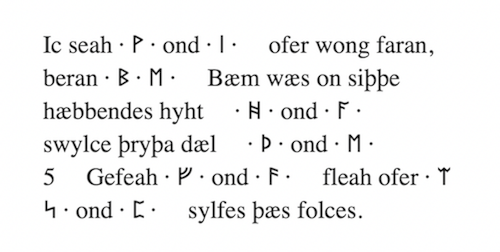Exeter Riddle 64
VICTORIASYMONS
Date: Thu 13 Jul 2017Matching Commentaries: Commentary for Exeter Riddle 64
Ic seah · ᚹ · ond · ᛁ · ofer wong faran,
beran · ᛒ · ᛖ · Bæm wæs on siþþe
hæbbendes hyht · ᚻ · ond · ᚪ ·
swylce þryþa dæl · ᚦ · ond · ᛖ ·
5 Gefeah · ᚠ · ond · ᚫ · fleah ofer · ᛠ
ᛋ · ond · ᛈ · sylfes þæs folces.
I saw w and i travel over the plain,
carrying b . e . With both on that journey there was
the keeper’s joy: h and a,
also a share of the power: þ and e.
5 F and æ rejoiced, flew over the ea
s and p of the same people.
w and i = wicg (horse)
b and e = beorn (man)
h and a = hafoc (hawk)
þ and e = þegn (man)
f and æ = fælca (falcon)
ea and s and p = easpor? (water-track)
Notes:
This riddle appears on folio 125r of The Exeter Book.
The above Old English text is based on this edition: Elliott van Kirk Dobbie and George Philip Krapp, eds, The Exeter Book, Anglo-Saxon Poetic Records 3 (New York: Columbia University Press, 1936), page 230.
Note that this edition numbers the text Riddle 62: Craig Williamson, ed., The Old English Riddles of the Exeter Book (Chapel Hill: University of North Carolina Press, 1977), page 105.
Screen shot for the runes:

Tags:
anglo saxon
exeter book
riddles
old english
solutions
riddle 64
Related Posts:
Exeter Riddle 19
Exeter Riddle 26
Exeter Riddle 7